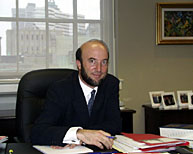Entre Nous with Provost Luc Vinet - Academic renewal: Brain gain for McGill
Entre Nous with Provost Luc Vinet - Academic renewal: Brain gain for McGill McGill University
User Tools (skip):
Entre nous with Provost Luc Vinet
Academic renewal: brain gain for McGill
How do you take a term like "academic renewal" and make it into a living, breathing and dynamic aspect of a university? In large part, that's the challenge facing McGill provost Luc Vinet. Vinet oversees academic personnel, teaching, research, student affairs and budgetary allocations for the university. His wide-ranging agenda for 2004–2005 touches on virtually every aspect of student, staff and faculty life from hiring 100 new faculty a year and recruiting deans to a new policy on discrimination and harassment. He spoke recently with the Reporter about the year ahead.

A key part of your job is academic renewal. What exactly is academic renewal and why is it important for McGill?
This all stems from the mid-'60s when universities in Quebec, and across North America, underwent a boom and lots of professors were hired. Now, 35 to 40 years later, we are seeing a massive retirement bulge. In addition, in the mid-'90s, McGill and other universities underwent severe government budgetary compressions which also resulted in a loss of faculty. Our academic renewal plan addresses these departures. If we had not taken action back in 1999, we would now be facing the prospect of losing at least half of our professors by 2010. Our academic renewal program is a 10-year plan designed to address the retirement bulge, grow the university and, at the same time, bring excellence, international experience and diversity to McGill. Academic renewal is my single most important responsibility. It will shape McGill for decades to come.
Can you give us an indication of the work involved in academic renewal and the progress to date?
Back in 1997 only 20 faculty members were hired. Once we embarked on a renewal program, we ramped this up very quickly to 100 or more new faculty a year — including this year. In fact, we're now slightly ahead of plan. This affects all aspects of the university, and it's not simply a matter of airlifting professors onto the campus. On the contrary, it's an intensive process involving many people from the faculties and departments. Recruiting just one professor is quite an operation; to repeat it 100 times is very big. And it doesn't stop with recruiting. We need to make sure that new faculty members fit into the university and everything is conducive to helping them do their best work. Then there's the human resource management of people at various levels — their careers, tenure, sabbaticals and involvement in the governance of their university. What's exciting is that new faculty members come with a fresh view of the university. That's the "renewal" part of academic renewal and it needs to be tapped. There's also a strategic dimension to this activity. The process of hiring so many new faculty is a window of opportunity for McGill to make changes and choices in its academic direction. This is our chance to affect shifts in programs and identify emerging areas.
What are your other key objectives and priorities for 2004–2005?
One pressing priority for me is the fact that we are looking to replace six of our deans. Also, this is the year for acting on the results of our planning exercise of last year. The purpose here is to look at the university in a very integrated fashion. We tend to talk independently about recruiting, developing programs, building facilities, setting up research centres, etcetera, but all this has to hold together. The challenge is to think — and act — in a very coherent fashion so that we optimize our development. In this integrated picture, we'll keep a focus on academic renewal, set up a full review of our teaching programs and push the development of excellence. In terms of other priorities, I will be presenting policies in a number of areas affecting academic personnel, including tenure regulations and adoption leaves. McGill also needs to show leadership in the development of policies and practices for academics in non-tenure track positions. The renewal of the McGill professors and Dawson Scholars program — along with that of the Canada Research Chairs — will need to be addressed. Last, but certainly not least, the policy on discrimination and harassment will be finalized and the university's Equity Office will be established.
What will you be working on in 2004–2005 in terms of research projects and infrastructure?
One outcome of our planning process is the determination to set up structures that foster, facilitate or best support initiatives that are interdisciplinary. One revolves around health and society; another around states, nations and development; and another around communications and ethics. We are currently finalizing the new life sciences complex and have proposals under consideration by the provincial government for a new pavilion for the Faculty of Arts and also for allied health disciplines. We will be working to bring those initiatives closer to fruition.
One significant element for this year is the decision to move ahead on the Montreal University Health Centre on the Glen Yards site. It will have a tremendous impact on our thinking going forward and affects our considerations regarding the development of more campuses, like a McGill campus next to the MUHC site. We are also determined to see the Royal Victoria complex remain a part of the university's downtown campus.
What has been the highlight of the year so far?
I attended an orientation event for new faculty members recently. There were about 60 or so new professors in the ballroom of the Faculty Club and at one point everyone introduced themselves and spoke a bit about their background. It was an impressive and moving experience to see so many young faces and it made me feel very confident and positive about what's happening at the university.
